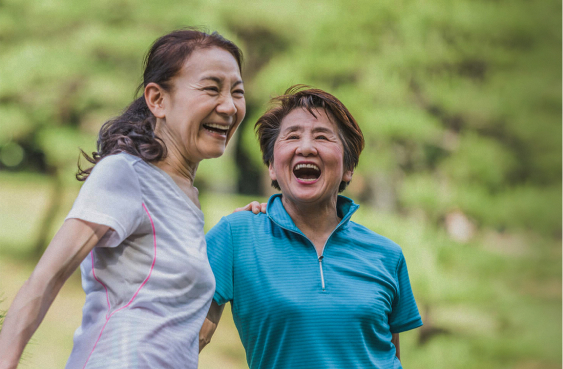

What to expect as we approach menopause?
Women’s transition from their years of childbearing potential into menopause is a topic that deserves to be discussed more openly because many women do not feel adequately prepared for this transition.
What to expect as we approach menopause?
Women’s transition from their years of childbearing potential into menopause is a topic that deserves to be discussed more openly because many women do not feel adequately prepared for this transition. These changes are a normal part of a biological woman’s life and do not mean that these women are ‘old’, or in decline. In fact, some experts consider it ‘the second puberty’ that leads to a new stage for women and this stage should not be scary. This article focuses on natural menopause, which is neither surgically nor medically induced.
Menopause officially starts 1 year after the date of your final menstrual period; you will be termed menopausal or even post-menopausal. However, it’s often perimenopause (the time leading up to menopause) that can cause women the most discomfort and upset. The whole process of changes can start from your mid-thirties when you can still get pregnant along the way.
Menopause brings about some changes
As you probably already know, most of the changes are due to fluctuations in hormones. Progesterone is produced when you ovulate, i.e. when your ovaries are functioning well and are not under the influence of contraceptives. Oestrogen is produced by the ovaries and can also be reproduced by tissues in many other parts of the body. These hormones fluctuate monthly in a typical pattern, but once perimenopause starts, this pattern starts to change, become more erratic and may lead to hormone imbalance.
These are not the only hormones involved because the hormonal systems in our body often act like a symphony orchestra, and a disruption to one hormone can affect the others. It takes time for your body to readjust, and sometimes you might need interventions. Some other hormonal systems can get affected by the changes of perimenopause and menopause which in turn affect our health, for example, our thyroid hormones and insulin functioning.

Symptoms of Perimenopause/Menopause
Some of the reported symptoms of perimenopause/menopause can be classified into 3 broad categories, namely body, skin and hair:
Body
(i) Insomnia
Many things can affect your sleep, from hot flashes or hot flushes to mood swings, stimulants like caffeine/ alcohol/ tobacco, hormonal fluctuations, exercising too late in the day, stress, bright screens late at night, needing to get up to use the toilet or even body pain. Fixing the true cause is important.
(ii) Breast pain and risk for breast cancer
Most breast pain is not cancer. Sore breasts (mastalgia) can be a common complaint in perimenopause with pain or tenderness in the front of the breast (not the side/armpit). Breast pain may be present all the time, or cyclically. The most common cause of this pain is excess oestrogen, but sometimes the pain can be influenced by histamine, a reaction to a medication, or low levels of iodine and/or progesterone. Helpful interventions include intake of progesterone and/or iodine, diet changes, as well as wearing a well-fitted, wire-free bra.
Breast cancer: With menopause, there is an increase in cancer risk. Some cancers are indeed influenced by sex hormones, such as oestrogen, but age itself is a bigger risk factor. Breast cancer is the most common cancer in females.
Other breast cancer risk factors include:
- family history of breast cancer or a known genetic mutation correlated to breast cancer
- early menarche (age at first menstrual period) or older at menopause (55+)
- alcohol intake
- smoking
- insulin resistance
- overweight
- hormone treatments – a history of taking hormonal birth control or other oestrogen/progestin therapies
If you have no family history of breast cancer, that counts in your favour, as does a history of breastfeeding. Still, much of what we do with our diet and lifestyle can reduce our chances of developing this disease. We recommend you do your breast self-checks every month and have other cancer screenings, not just for ‘female’ cancers.
(iii) Cardiovascular disease
Our risk of heart disease and stroke increases to around the same level as men’s risk once we are menopausal. Before menopause, our female hormones offer cardiovascular protection, which disappears once our hormone pattern changes. Heart attack incidence in women increases around 10 years after menopause, and heart disease is a leading cause of death. As with all chronic diseases, a healthy lifestyle is the best prevention. Having an annual health screening to monitor your cardiovascular health in midlife is critical for catching issues early and being able to manage them well.
(iv) Weight Gain
Your calorie requirements go down during perimenopause and beyond – so eating the same amount means you will gain fat. A little weight gain may be ok, and even healthy for some women because fat tissue can produce some oestrogen. Aside from raising the risk of multiple diseases, excess fat sometimes indicates another hormonal problem in the body, such as high-stress hormone levels indicated by tummy fat.
For weight management, it’s no surprise that the top methods are made up of diet, movement (training exercises and other activities), sleep and stress levels. Be very wary of extreme diets as they tend to slow your metabolism even more and have risks for bone health. We lose muscle easily from age 50 onwards, and we lose some bone density as well, so even if you stay the same clothing size and the same weight, your body composition, i.e. the proportion of fat, compared to muscle and bone may have changed, and this still affects your health risks.
(v) Vaginal dryness and urinary incontinence issues
The most well-known menopause symptom is dryness and vaginal lubrication loss, which can be uncomfortable. It’s part of what’s called GSM (genitourinary syndrome of menopause), a category of symptoms that is increasingly common with age after menopause: basically bladder, vaginal and pelvic floor symptoms like recurrent urinary tract infections, vaginal dryness, vulval discomfort, pain during sex, urinating when you cough, etc. These changes occur due to hormonal shifts that can affect your body tissue strength. GSM symptoms tend to worsen if you do nothing about them, so don’t be shy to seek medical help early. Vaginal oestrogen is the top intervention for GSM, but there are also other medications and clinic-based therapies available, like laser and radio frequency treatments.
Skin
Skin problems: dryness and pigmentation
Many women notice accelerated skin ageing during perimenopause and beyond. This is due to the drop in both oestrogen and progesterone that affects the production of collagen, tissue structure and natural oil levels. Other possible internal factors can include male sex hormones (which women also have), as well as insulin/blood glucose levels, thyroid hormones, and even digestion. All of these shifts can lead to changes in our skin, resulting in thinning skin, more lines, wrinkles, and dry skin. Rashes, itching, tingling or pigmentation and age spots may also occur. Exposure to the sun and allergenic substances can interact with the natural melanin content of your skin. As an example, Asian skin has more melanin than Caucasian skin, so the types of hyperpigmentation issues can show up in different ways depending on your heritage.
Hair
(i) Hair fall/ thinning of hair
Hair changes can affect menopause – as female hormones drop, we have a relative excess of male hormones, which can cause unwanted hair growth in some places, and hair loss in others. However, there can be many other triggers for hair changes so work with your doctor to check for the true cause so that you can get the correct treatment. Besides female hormones, other factors that can influence hair health include other hormonal imbalances, insulin issues, thyroid issues, stress, autoimmune diseases, fungal infection, medications, cardiovascular issues, stomach acid problems, and various nutrient deficiencies.
(ii) More hair on the face
It is possible for some women to notice more facial hair, especially on the upper lip and chin, which could be anything from one new coarse hair to your usual fine hair becoming more noticeable and downy. As the oestrogen level declines, testosterone circulates and dominates within hair follicles, affecting where we grow/lose hair.
The more testosterone you have, the more imbalanced your hormones become, and the more you will have facial hair growth. While this phenomenon is not medically harmful, it can affect our self-esteem and conflict with how we view femininity. In the same way as body hair, facial hair can also be removed. There are also treatments and products available to manage future growth.
Conclusion
Many women report feeling a huge sense of freedom and life satisfaction once they have settled into menopause. In the lead-up to that, it might be a rollercoaster at times. Still, it won’t last forever – you will eventually adjust and come to a place of healthy balance, physically and emotionally. In general, women tend to avoid seeking help and treatment for menopause due to the negative psychological associations we have with it, and our tendency to ‘let it all go’ is what prevents us from finding good help and solutions. Instead, reach out to our team of female doctors with any questions, and speak to others who have been through this.
About Fusion Medical
Fusion Medical was set up in the year 2015. Our founders, being passionate about offering one-stop quality healthcare services at affordable rates, decided to set up an Executive Medical Centre equipped with diagnostic and imaging equipment under one roof to provide convenience to our patients. Diagnostic and imaging equipment include X-Ray, Ultrasound, Treadmill, Echocardiogram, Tonometry, Mammogram, Retinopathy and Bone Densitometry.
Why Choose Fusion Medical
We Make Things Easy For You
Our clinic is centrally located in Wheelock Place, giving you easy access to quality healthcare services whenever you need it. Appointments are easy, too. Request an appointment online or call us.
Female Doctors Who Understand You
Our female doctors offer a broad range of screening and medical services, personalised just for you. Doctor-patient relationships can last a lifetime, and we believe that it is important to have a doctor who truly understands you. We strive to do the best we can to make you feel comfortable.
Fully Equipped Clinic
We are committed to meeting your specific needs at our clinic. Our clinic is fully equipped with diagnostic and imaging equipment to provide one-stop convenience for you.
Visit Us
Start your skin health restoration journey with us today!
Fusion Medical @ Wheelock
Mon-Fri :8:30am – 5:30pm
Sat :8:30am – 1:00pm
Sun / PH :Closed
Fusion Medical @ Fusionopolis
@ One-North , Singapore 138542
Mon-Fri :8:30am – 5:30pm
Sat/Sun / PH :Closed




